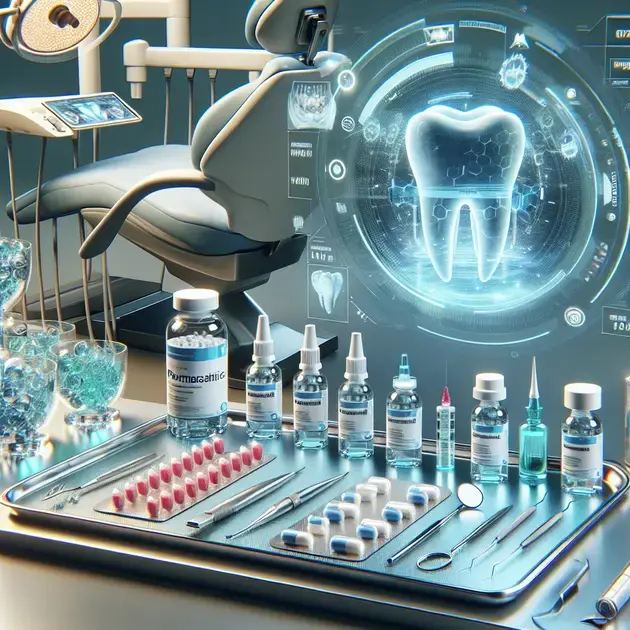Periodontitis can be a challenging condition to deal with, affecting the gums and potentially leading to tooth loss if left untreated. In this comprehensive guide, we will explore the most effective medication options available to manage and treat periodontitis successfully.
Advancements in dental research have led to the development of innovative medications specifically designed to target the bacteria responsible for periodontitis. With the information provided in this guide, you will gain valuable insights into the latest treatment options and their effectiveness in combating this common dental issue.

Effective Treatment Options for Periodontitis
Periodontitis is a serious gum infection that can damage the soft tissue and destroy the bone that supports your teeth. It is essential to seek effective treatment options to prevent further progression of the disease. Here are some steps you can take to effectively treat periodontitis:
1. Consult a Periodontist
The first step in treating periodontitis is to schedule an appointment with a periodontist. A periodontist is a dentist who specializes in the prevention, diagnosis, and treatment of gum disease. They will assess the severity of your condition and recommend the most appropriate treatment plan.
2. Scaling and Root Planing
Scaling and root planing is a common non-surgical treatment for periodontitis. This procedure involves removing plaque and tartar from the surfaces of your teeth and roots, smoothing the root surfaces to promote gum reattachment.
3. Antibiotic Therapy
Your periodontist may prescribe antibiotics to help control the infection and promote healing. Antibiotics can be taken orally or applied directly to the infected areas of the gums.
4. Laser Therapy
Laser therapy is a minimally invasive treatment option for periodontitis. It involves using a dental laser to remove infected tissue and promote gum regeneration. This treatment is often less painful and requires less healing time compared to traditional surgical methods.
5. Ongoing Maintenance
After undergoing treatment for periodontitis, it is crucial to maintain good oral hygiene practices to prevent recurrence. Brushing and flossing regularly, attending regular dental check-ups, and following your periodontist’s recommendations are essential for long-term oral health.
Understanding the Role of Medications in Periodontal Care
Medications play a significant role in the treatment of periodontal disease by helping to control infection, reduce inflammation, and promote healing. Understanding how medications are used in periodontal care can help maximize the effectiveness of your treatment plan. Here are some key points to consider:
1. Antibiotics
Antibiotics may be prescribed to treat periodontitis, especially in cases of severe infection. These medications can be taken orally, topically, or applied directly to the infected areas of the gums. It is essential to follow your dentist or periodontist’s instructions carefully when taking antibiotics.
2. Antiseptic Mouthwashes
Antiseptic mouthwashes containing chlorhexidine or essential oils can help reduce bacteria in the mouth and prevent further infection. Using a recommended antiseptic mouthwash as part of your daily oral hygiene routine can aid in controlling periodontal disease.
3. Anti-inflammatory Drugs
Nonsteroidal anti-inflammatory drugs (NSAIDs) can help reduce inflammation and pain associated with gum disease. Your dentist may recommend over-the-counter or prescription NSAIDs to manage symptoms and improve your overall comfort during treatment.
4. Bone-Modifying Agents
In advanced cases of periodontitis, bone-modifying agents may be used to help regenerate lost bone and support the teeth. These medications work to promote bone growth and enhance the success of other periodontal treatments.
5. Personalized Medication Plans
Your dentist or periodontist will develop a personalized medication plan based on the severity of your periodontal disease and your overall health. It is crucial to communicate any allergies or reactions to medications to ensure safe and effective treatment.
Maximizing the Benefits of Innovative Medications
Innovative medications have revolutionized the field of periodontal care by offering new treatment options for patients with gum disease. To maximize the benefits of these innovative medications, it is essential to understand how they work and incorporate them into your overall oral health routine. Here are some tips for getting the most out of innovative medications:
1. Stay Informed
Keep up to date with the latest developments in periodontal medications by consulting reputable sources such as dental journals and online resources. Understanding how innovative medications work can help you make informed decisions about your treatment plan.
2. Follow Your Dentist’s Recommendations
Your dentist or periodontist will recommend the most appropriate medications based on your specific needs and treatment goals. It is essential to follow their guidance and take medications as directed to ensure optimal results.
3. Maintain Good Oral Hygiene
While medications can play a crucial role in treating periodontal disease, they are most effective when combined with good oral hygiene practices. Brushing, flossing, and using antimicrobial mouthwashes can help enhance the benefits of innovative medications.
4. Monitor Your Progress
Keep track of your symptoms, gum health, and overall oral hygiene routine to monitor the effectiveness of the medications. If you notice any changes or concerns, be sure to discuss them with your dentist or periodontist promptly.
5. Attend Regular Check-Ups
Regular dental check-ups are essential for evaluating the progress of your periodontal treatment and adjusting your medication plan as needed. By staying proactive and following up with your dental care team, you can ensure that you are maximizing the benefits of innovative medications for your oral health.

Effective Treatment Options for Periodontitis
Periodontitis is a serious condition that affects the gums and bone supporting the teeth, leading to inflammation and potential tooth loss if left untreated. When it comes to effective treatment options for periodontitis, it is essential to consider both non-surgical and surgical interventions. Non-surgical treatments often involve deep cleaning procedures such as scaling and root planing to remove plaque and tartar from the root surfaces. These procedures can help reduce inflammation and promote gum healing.
In more severe cases, surgical treatments may be necessary to address advanced periodontitis. Surgical options include flap surgery to lift the gums and remove tartar deposits, as well as bone and tissue grafts to regenerate lost bone and gum tissue. These interventions can help stabilize the teeth and prevent further progression of the disease.
Additionally, adjunctive therapies such as antibiotics and antimicrobial mouth rinses may be prescribed to control bacterial infections and promote healing. Maintaining good oral hygiene practices and regular dental visits are also crucial components of effective periodontal treatment to prevent recurrence.
Overall, a comprehensive treatment approach that combines non-surgical and surgical interventions, along with supportive therapies, is key to effectively managing periodontitis and preserving oral health.
Understanding the Role of Medications in Periodontal Care
Medications play a crucial role in periodontal care by helping to manage inflammation, control bacterial infections, and support the healing process. Antimicrobial agents, such as antibiotics and antiseptics, are commonly prescribed to target and eliminate harmful bacteria in the gums and periodontal pockets.
Anti-inflammatory medications, such as nonsteroidal anti-inflammatory drugs (NSAIDs), can help reduce swelling and discomfort associated with periodontal disease. These medications may be recommended in combination with periodontal treatments to enhance therapeutic outcomes.
In some cases, medications delivered locally, such as through gels or chips placed directly in the periodontal pockets, can provide targeted treatment and improve the effectiveness of traditional therapies. These localized medications can help combat infection and promote tissue healing in specific areas of the gums.
It is important for patients to follow their dentist or periodontist’s recommendations regarding medication use, dose, and duration to achieve optimal results. Proper medication management, along with professional dental care and good oral hygiene practices, can significantly contribute to successful periodontal treatment outcomes.
Conclusion
In conclusion, the effective treatment options for periodontitis encompass a combination of non-surgical and surgical interventions to address the varying severity of the condition. Non-surgical treatments like scaling and root planing are essential for removing plaque and tartar, reducing inflammation, and promoting gum healing. On the other hand, surgical procedures such as flap surgery and grafts play a crucial role in managing advanced periodontitis by stabilizing teeth and preventing further disease progression.
Furthermore, medications are integral to periodontal care as they aid in managing inflammation, controlling bacterial infections, and supporting the healing process. Antimicrobial agents target harmful bacteria, while anti-inflammatory medications like NSAIDs help alleviate discomfort associated with periodontal disease. Localized medications delivered through gels or chips provide targeted treatment, enhancing the effectiveness of traditional therapies and promoting tissue healing in specific gum areas.
Patient adherence to medication recommendations, proper dosage, and duration, as advised by dental professionals, is vital for optimal treatment outcomes. Combined with professional dental care and good oral hygiene practices, medications significantly contribute to successful periodontal treatment results. It is imperative for individuals to follow a comprehensive approach involving both treatment modalities and medication management to effectively manage periodontitis and preserve oral health in the long term.



